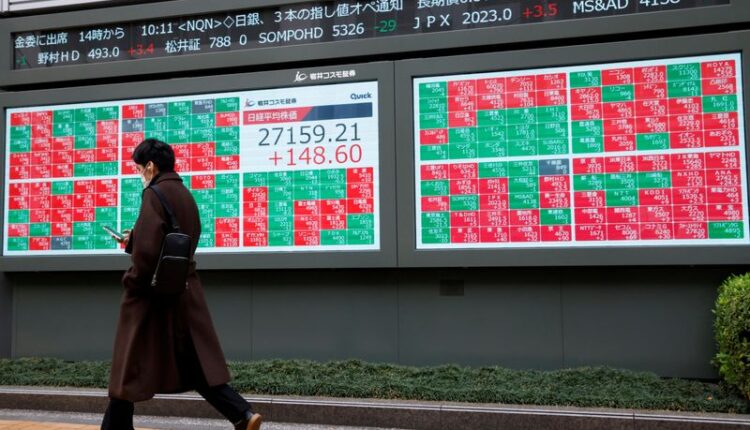Scramble for safety subsides as markets digest Credit Suisse rescue
By Marc Jones
LONDON (Reuters) – Europe’s bank shares fought back from an early slump on Monday and a cross-asset scramble for safety looked to have eased, as markets weighed the implications for the financial system from the emergency rescue of banking heavyweight Credit Suisse.
Sunday saw the most dramatic state intervention since the 2008 global financial crisis, with UBS buying Credit Suisse for 3 billion francs ($3.2 billion) in a takeover backstopped by unlimited funding pledges from the world’s top central banks.
Shocked European bank shares had initially dropped 6% as Credit Suisse’s own shares slumped 63% and those of its acquirer UBS tumbled nearly 13%. (EU)
But as investors digested the support and the pace at which it had come, a recovery had started and by the time Wall Street was ready to open, bank shares were level again and both the broader European STOXX 600 and UBS shares were 1% higher.
“Credit Suisse is our Lehman moment in Europe, but we recognise that and we are not going to make the same mistake,” Close Brothers Asset Management Chief Investment Officer Robert Alster said of the speedy action by authorities over the weekend.
He said the European Central Bank, Bank of England and others would be well aware “of the next gazelles in the chain that the lions will be hunting” – meaning other large banks with investment banking arms such as Deutsche Bank (ETR:DBKGn), BNP in France or Barclays (LON:BARC) in the UK – and will step in with support if needed.
“There is a lot of firepower from the authorities to counter what is the steadily eroding loss of confidence,” Alster said.
Traditional safe harbours like Europe’s government bonds and gold had rallied as the stock markets initially balked.
Yields on triple A-rated German Bunds, which fall as bond prices rise, had hit their lowest since mid-December at 1.951% in the early panic, but shuffled back above 2% as markets began to relax a little.
Risk aversion had also seen the spread between riskier Italian debt and German debt widen out to over 200 basis points again, but that gap – which reflects how much more Rome has to pay to borrow than Berlin – was also improving. [GVD/EUR]
“There was nothing great that could come out of this (Credit Suisse takeover), but it is probably the best of a bad list of outcomes,” said AXA Chief Economist Gilles Moec, who had been surprised by the initial rout.
“All in all, this was pretty swift,” he added. “And in terms of reassurances (from authorities) it is pretty decent.”
(Graphic: Credit Suisse goes off piste Credit Suisse goes off piste – https://www.reuters.com/graphics/CREDITSUISSEGP-STOCKS/akveqegdgvr/chart.png)
AT1 RIP?
Wall Street’s main indexes opened little changed, with the odds of the Federal Reserve hiking its interest rates again on Wednesday in flux following all the recent troubles in the banking system.
U.S. authorities have seen two banks, Silicon Valley Bank and Signature Bank (NASDAQ:SBNY), both implode this month under the pressure of rising interest rates and a third, regional bank First Republic Bank (NYSE:FRC), has also required emergency support.
Its shares dropped 14% soon after the opening.
The rudest shock in the rushed deal to save Credit Suisse was reserved for the holders of the bank’s riskiest tranche of bonds, known as AT1s, that can be converted into equity when troubles hit.
Not only did they discover they are the only investors not getting any compensation from the rescue, but that the long-established practice of giving bondholders priority over shareholders in debt recovery had been turned on its head.
The result was a selloff in Asian AT1s overnight. But European supervisors quickly stepped in there too, reassuring European traders that Swiss authorities’ actions weren’t likely to be replicated in the European Union at least.
“This approach (of hitting shareholders before bondholders) has been consistently applied in past cases and will continue to guide the actions of the SRB (Single Resolution Board) and ECB banking supervision in crisis interventions,” they said in a statement.
“Additional Tier 1 is and will remain an important component of the capital structure of European banks,” they added.
Commodity markets had seen oil prices hit their lowest since 2021 amid worries that the banking woes would add to recession risks, but Brent, like stocks, recovered and moved higher. [O/R]
Safe-haven demand eased in the currency markets as well with the Japanese yen trimming its day’s gain to 0.5% from 0.75%.
Both the Swiss franc and the euro started to rise against an unusually subdued U.S. dollar, which is normally a winner in turbulent times. [/FRX]

